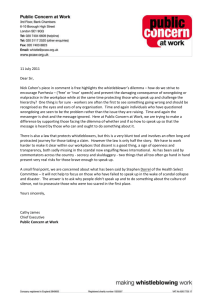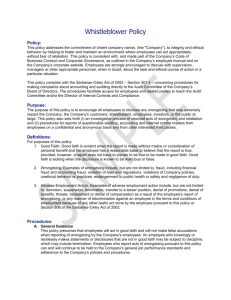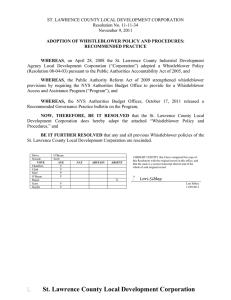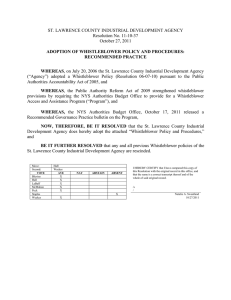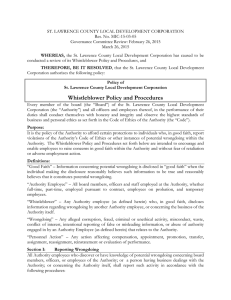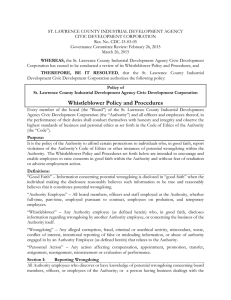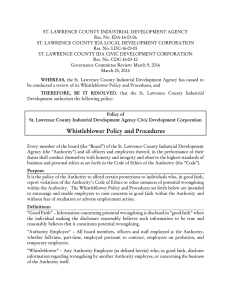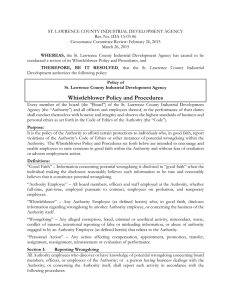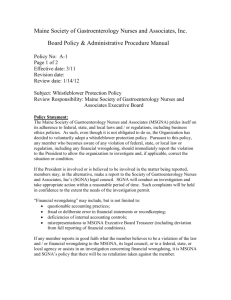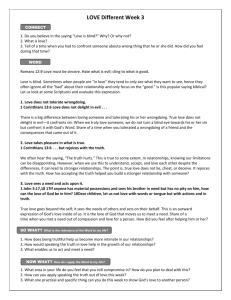ST. LAWRENCE COUNTY INDUSTRIAL DEVELOPMENT AGENCY CIVIC DEVELOPMENT CORPORATION Resolution No. CDC-11-10-14
advertisement
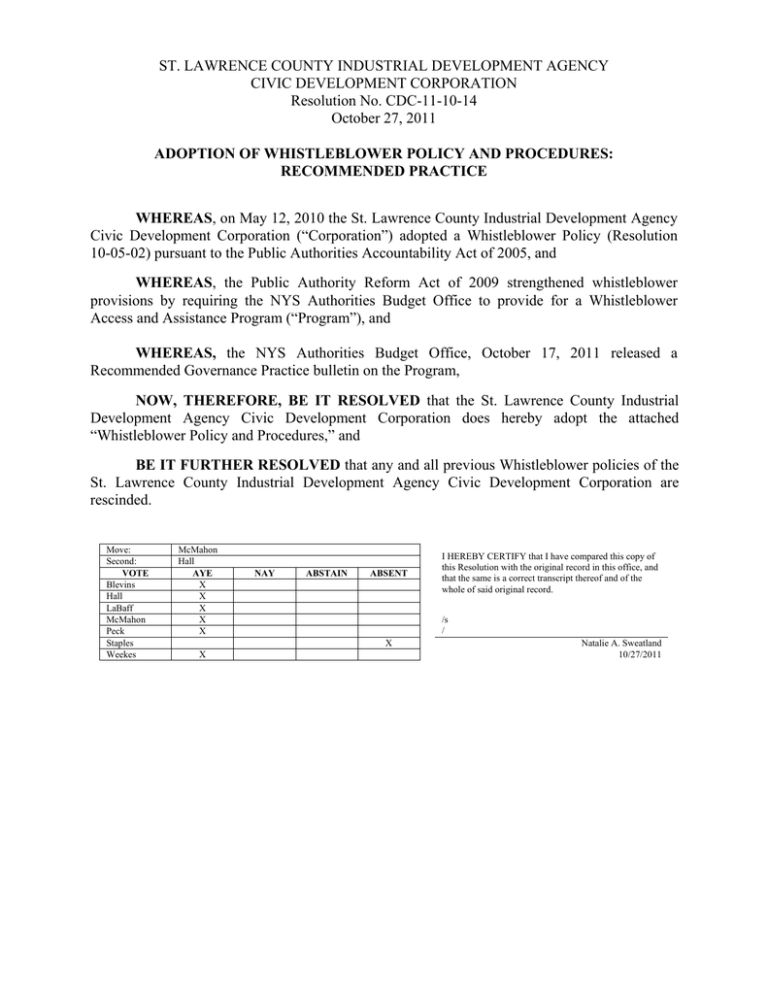
ST. LAWRENCE COUNTY INDUSTRIAL DEVELOPMENT AGENCY CIVIC DEVELOPMENT CORPORATION Resolution No. CDC-11-10-14 October 27, 2011 ADOPTION OF WHISTLEBLOWER POLICY AND PROCEDURES: RECOMMENDED PRACTICE WHEREAS, on May 12, 2010 the St. Lawrence County Industrial Development Agency Civic Development Corporation (“Corporation”) adopted a Whistleblower Policy (Resolution 10-05-02) pursuant to the Public Authorities Accountability Act of 2005, and WHEREAS, the Public Authority Reform Act of 2009 strengthened whistleblower provisions by requiring the NYS Authorities Budget Office to provide for a Whistleblower Access and Assistance Program (“Program”), and WHEREAS, the NYS Authorities Budget Office, October 17, 2011 released a Recommended Governance Practice bulletin on the Program, NOW, THEREFORE, BE IT RESOLVED that the St. Lawrence County Industrial Development Agency Civic Development Corporation does hereby adopt the attached “Whistleblower Policy and Procedures,” and BE IT FURTHER RESOLVED that any and all previous Whistleblower policies of the St. Lawrence County Industrial Development Agency Civic Development Corporation are rescinded. Move: Second: VOTE Blevins Hall LaBaff McMahon Peck Staples Weekes McMahon Hall AYE X X X X X NAY ABSTAIN ABSENT /s / X X I HEREBY CERTIFY that I have compared this copy of this Resolution with the original record in this office, and that the same is a correct transcript thereof and of the whole of said original record. Natalie A. Sweatland 10/27/2011 WHISTLEBLOWER POLICY and PROCEDURES Approved and Adopted on October 27, 2011 Resolution No.: CDC-11-10-14 Every member of the board (the “Board”) of the St. Lawrence County Industrial Development Agency Civic Development Corporation (the “Corporation”) and all officers and employees thereof, in the performance of their duties shall conduct themselves with honesty and integrity and observe the highest standards of business and personal ethics as set forth in the Code of Ethics of the Corporation (the “Code”). Purpose: It is the policy of this Public Authority to afford certain protections to individuals who, in good faith, report violations of the Public Authority’s Code of Ethics or other instances of potential wrongdoing within the Public Authority. The Whistleblower Policy and Procedures set forth below are intended to encourage and enable employees to raise concerns in good faith within the Public Authority and without fear or retaliation or adverse employment action. Definitions: “Good Faith” – Information concerning potential wrongdoing is disclosed in “good faith” when the individual making the disclosure reasonably believes such information to be true and reasonably believes that it constitutes potential wrongdoing. “Public Authority Employee” – All board members, officers and staff employed at this Public Authority, whether full-time, part-time, employed pursuant to contract, employees on probation, and temporary employees. “Whistleblower” – Any Public Authority Employee (as defined herein) who, in good faith, discloses information regarding wrongdoing by another Public Authority employee, or concerning the business of the Public Authority itself. “Wrongdoing” – Any alleged corruption, fraud, criminal or unethical activity, misconduct, waste, conflict of interest, intentional reporting of false or misleading information, or abuse of authority engaged in by a Public Authority Employee (as defined herein) that relates to the Public Authority. “Personnel Action” – Any action affecting compensation, appointment, promotion, transfer, assignment, reassignment, reinstatement or evaluation of performance. Section I: Reporting Wrongdoing All Public Authority Employees who discover or have knowledge of potential wrongdoing concerning board members, officers, or employees of this Public Authority; or a person having business dealings with this Public Authority; or concerning the Public Authority itself, shall report such activity in accordance with the following procedures: a) The Public Authority Employee shall disclose any information concerning wrongdoing either orally or in writing to the Chief Executive Officer or Counsel of the Public Authority. b) All Public Authority Employees who discover or have knowledge of wrongdoing shall report such wrongdoing in a prompt and timely manner. c) The identity of the Whistleblower and the substance of his or her allegations will be kept confidential to the best extent possible. d) The individual to whom the potential wrongdoing is reported shall investigate and handle the claim in a timely and reasonable manner, which may include referring such information to the Authorities Budget Office or an appropriate law enforcement agency, where applicable. e) Should a Public Authority Employee believe in good faith that disclosing information within the Public Authority pursuant to Section 1(a) above would likely subject him or her to adverse personnel action or be wholly ineffective, the Public Authority Employee may instead disclose the information to the Authorities Budget Office or an appropriate law enforcement agency, if applicable. The Authorities Budget Office’s toll free number (1-800-560-1770) should be used in such circumstances. Section II: No Retaliation or Interference No Public Authority Employee shall retaliate against any Whistleblower for the disclosure of potential wrongdoing, whether through threat, coercion, or abuse of authority; and no Public Authority Employee shall interfere with the right of any other Public Authority Employee by any improper means aimed at deterring disclosure of potential wrongdoing. Any attempts at retaliation or interference are strictly prohibited, and a) No Public Authority Employee who, in good faith, discloses potential violations of this Public Authority’s Code of Ethics or other instances of potential wrongdoing, shall suffer harassment, retaliation or adverse personnel action. b) All allegations of retaliation against a Whistleblower or interference with an individual seeking to disclose potential wrongdoing will be thoroughly investigated by this Public Authority. c) Any Public Authority Employee who retaliates against or had attempted to interfere with any individual for having in good faith disclosed potential violations of this Public Authority’s Code of Ethics or other instances of potential wrongdoing is subject to discipline, which may include termination of employment. d) Any allegation of retaliation or interference will be taken and treated seriously and irrespective of the outcome of the initial complaint, will be treated as a separate matter. Section III: Other Legal Rights Not Impaired The Whistleblower Policy and Procedures set forth herein are not intended to limit, diminish or impair any other rights or remedies that an individual may have under the law with respect to disclosing potential wrongdoing free from retaliation or adverse personnel action. a) Specifically, these Whistleblower Policy and Procedures are not intended to limit any rights or remedies that an individual may have under the laws of the State of New York, including but not limited to the following provisions: Civil Service Law § 75-b, Labor Law § 740, State Finance Law § 191 (commonly known as the “False Claims Act”) and Executive Law § 55(1). b) With respect to any rights or remedies that an individual may have pursuant to Civil Service Law § 75-B or Labor Law § 740, any employee who wishes to preserve such rights shall prior to disclosing information to a government body, have made a good faith effort to provide the appointing authority or his or her designee the information to be disclosed and shall provide the appointing authority or designee a reasonable time to take appropriate action unless there is imminent and serious danger to public health or safety. (Ref: Civil Service Law § 75-b[2][b]; Labor Law § 740[3])
